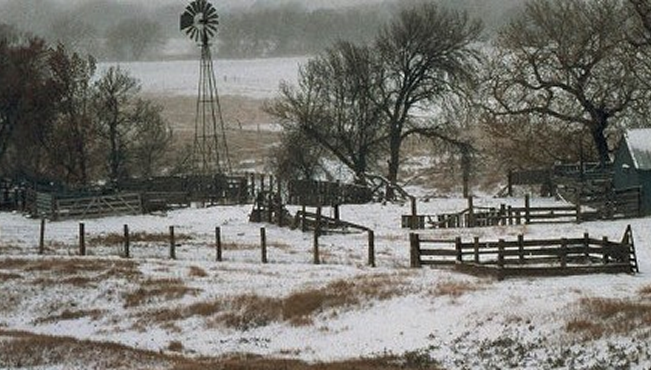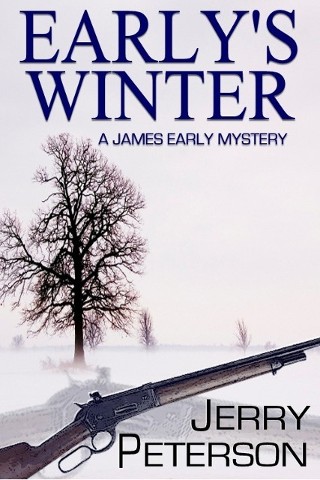Following the seasons
James Early's life came apart in book 1, Early's Fall, when his wife died, or perhaps killed herself, in a car crash. Several readers said to me, Early's fall, yes, that's what the book is about.
I'm not great in coming up with titles. I never thought about that interpretation when I created it. But I don't argue with the reader who says Early's life being destroyed is what the book about.
To me, Early's Fall, although it starts in the summer, much of the story takes place in the fall of the year. Early's fall, it's simply the season.
Staying with that thought meant book 2 in the series would have to be Early's Winter because it would take place in . . .
Here's the thumbnail of the story: A family is murdered for no apparent reason. The worst of the deaths in that isolated ranch house for James Early are those of the children, two of them twin boys less than a year old.
No, not the worst. Before his investigation is over, a friend will be killed while helping Early, and Early will see it as his fault, that he was responsible. If there is to be peace for him, it will come from a new acquaintance no one believes exists.
So here's chapter 1.
DECEMBER 12 – TUESDAY SHORT OF MIDNIGHT – U.S. TWENTY-FOUR
Headlights dead-on blasted James Early back into the real world.
His hands shot to the steering wheel and he spun it, whipping his Jeep toward the side of the highway. The vehicle swung into a crosswise skid, its tires scraping grooves into the hard-packed snow that blanketed the highway, grooves that became circles as the Jeep’s rear end chased its front around.
Early braced himself, and the right tires raked into the gravel and snow of the shoulder, sending out a shower of white and rock. The Jeep stopped hard, once more facing north, the direction in which Early had been going.
His hands shook as he sat there. He willed his left away from the steering wheel, to the switch for his spotlight. Early rattled the light on. He turned its beam into the headlights. By squinting, he made out a four-door halfway in the ditch at the far side of the highway, the ditch drifted full. How long had the car been there and why? The car – a Buick, Early was certain of that, and there was something about the car, something familiar. He thought he recognized it, but whose?
He let out the clutch and his Jeep rolled on. Early swept the side of the Buick with his spotlight as he idled by – someone inside on the driver’s side – but he couldn’t make out the face through the half-open window. And why didn’t the man respond to the light? Why didn’t he try to shade his eyes?
When past, Early eased his Jeep around. He brought it up behind the Buick – stuck in the snow? Possibly. He flicked off his spotlight and turned on his bubble light, the red light revolving, a warning to any other fool out so late who might be nearing this troubled spot.
Early stepped out onto the hard snow, flashlight in hand, his boots soundless for the snow had no give in it. He flicked on his Everready as he approached the driver’s door. He aimed the beam inside, splaying it over the profile of the driver – and he recognized him. Al Garret, a rancher from up near May Day. Garret’s head nodded forward. His chin rested on his ample chest. And Early could hear it, the car’s engine idling.
“Al, ’scuse me,” he said. When Garret didn’t answer, Early reached in. He shook the man’s shoulder. “You all right, buddy?”
Garret woke with a start. When he became aware of the revolving red light and saw Early’s badge, he dropped the transmission into first and floored the accelerator.
Early yanked his arm out of the car and, as he stepped back, watched the howling rear tires throw up snow, the car going nowhere. Garret rammed the transmission into second and again stepped the gas pedal to the floor, and that gave Early an idea. He came up beside the car and jogged in place, running harder as the Buick’s speedometer rose. When the needle touched fifty, Early hollered at the driver’s window, “Hey! Pull over. Now!”
Garret, startled again, glanced toward Early running all out and took his foot off the gas. He turned his steering wheel to the side as his speedometer’s needle fell back toward zero, Early slowing as the needle dropped.
“Better turn the engine off,” Early said, huffing, faking hard breathing. He leaned against the driver’s window glass.
After Garret did as he had been told, he peered over, glassy-eyed. “You the sheriff?” he asked, his voice salt-cracker dry.
“Right.”
“Sure run fast for an old guy. Musta been doin’ fifty-five.”
“Al, you drunk?”
“No. Know where I am?”
“Headed for Manhattan.”
“Naw, can’t be. I’m goin’ home.”
“Home’s the other direction, buddy. Better step out here.”
Garret fumbled at the door handle. It didn’t yield, so he wrestled with it. Still the handle did not give. “Some yahoo locked me in my car, sheriff.”
Early wanted badly to laugh, but forced himself to keep a straight face as he pulled up on the outside handle. The door swung open, and Garret tumbled out. Early helped him up with car driver clawing against Early’s arm for support.
“My feet don’t wanna work,” he said, leaning against Early.
“Well, see if you can make them work well enough to walk a straight line.”
“Huh?”
“Walk a straight line.”
“Why?”
“It’s a test. Can you do that?”
“Any day of the week, by damn.”
“Well, this is your day, Al.”
Garret, puffy, with the heavy shadow of not having shaved for some time, pushed off, his overcoat wrongly buttoned and his hat askew. He teetered a moment and collapsed against the side of his car, twisting around. He slid down to rest on his butt in the snow.
Early gazed at him, then went to his Jeep. There he took down his microphone from its hanging place, over the mirror, and pressed the transmit button. “Big John, you out there?”
Static answered, followed by an easy baritone. “Coming out of Manhattan on Twenty-Four. Need something?”
“I’m five miles ahead of you. I got Al Garret here, skunked out of his mind. How about you drive him home?”
“Wouldn’t you prefer jail for him?”
“No, Marlene will punish him a whole lot more than we can.”
“She’s a hellfire. Be there in a couple minutes.”
“Roger that.” Early hung his microphone back over the mirror. He went back to where Garret, father of three young children, snored, unaware of the snow and cold.
Early hunkered down beside him. “Al, what trouble have you got yourself into? Bet drinking’s only a part of it. One thing’s certain from the smell, you’ve got enough alkie in you, if I lit a match, you’d go up in flames.”
Early blew on his gloved hands. He rubbed them, working up friction to warm them. “Your daddy, rest his soul, he’d be ashamed to see you like this.”
Headlights coming from the south poked over the far side of a rise.
“Bet this is your ride,” Early said. He pushed himself up and waved at the approaching headlights. The vehicle slowed, and Early could tell from the descending whine of the engine that it was a Jeep – a four-cylinder Ford motor, not a V-Eight rumbler like he had in his.
The vehicle stopped short, with its headlights bathing Early, the Buick, and Garret – Garret still asleep. A big man stepped out, silhouetted as he strolled forward, cowboy hat on and a fur collar turned up around his ears – John Silver Fox, a Potawatomi Indian and once an MP with the occupation army in post-war Japan.
“Hey, John,” Early said.
“Hey, sheriff. You don’t want to take him?”
“I was supposed to be home hours ago, but that darn county commission meeting just kept dragging on.”
“Can be a pain, can’t they?”
“He’s all dead weight. Think it’s going to take both of us to get him up.”
“Might if I was as little a fella as you.” Silver Fox stepped over to Garret. He grabbed the drunk by the front of his coat and jerked him up. Silver Fox tossed Garret across his shoulder with the same ease a man would a sack of grain. “Get the door for me?”
Early hustled ahead, to the passenger side of his night deputy’s Jeep. He wrenched the door open, and Silver Fox dumped Garret inside, the canvas roof raking Garret’s hat off. Early recovered the fedora. He handed it to Silver Fox as the two rambled back to the Buick. There Early’s nose wrinkled when he turned off the car’s headlights – the interior reeked of Jack Daniels. He rolled shut the driver’s window and pulled the ignition key.
Early passed the key to Silver Fox. “Give this to Marlene. Tell her, after she blisters old Al’s ears, I want her to have him in Judge Crooke’s courtroom first thing in the morning.”
“The hangin’ judge? You got it in for young Mister Garret?”
“Fool broke the law. I figure the county’s got a right to a chunk of his money. You’d like a raise, wouldn’t you?”
“Wouldn’t object,” Silver Fox said. He went back to his Jeep and drove off, waving to Early.
Early, slouch shouldered, sheepskin-lined denim jacket, a cattleman’s hat, and a shaggy mustache that made him look every bit the cowboy that he was, tramped to his Jeep. There he leaned against the door and wondered what the heck Al Garret had been doing out there drunk, kids at home, well-to-do – a man who, by all appearances, had everything anyone could want.

